Why trans activists protest at some feminist events.
The media like a story, and if it fits within the culture war narrative, such as trans rights, that story will undoubtedly get published by the right-wing media if it can be spun in a negative way.
One narrative often headlined is “trans activists” protesting at “feminist” or “women’s” conferences or events.
The stories published in a newspaper tend to convey that there is a baying mob of yobs frothing at the mouth, attempting to attack women. The reality is something very different.
To be clear, there are no protests at all women’s or feminist events or conferences. For example, the UK’s most prominent women’s organisation, the Women’s Institute, with some 6300 branches and 220,000 members, does not experience any protests at all. The organisations that attract protests are ones with “gender-critical” views or those organised by so-called “exclusionary feminists” – in essence, ones who invariably promote exclusion within society, hate or, in extreme cases, celebrate the murder of trans people such as Brianna Ghey.
People only protest when they feel the need to.
People only protest when they feel the need to. For example, nurses, schoolteachers, or ambulance drivers who have a grievance about pay or working conditions may undertake a march and protest in Parliament Square. Most protesters would rather be at work or home with their families but take the time to protest because they have a cause.
The same applies to the protests at the gender critical events often labelled “feminist events” – in reality, they are often the gathering of those who hate (or even worse) people who are transgender.
These “feminist events” can be compared to events from the far-right and organisations like the National Front. Formed in 1967 due to the merger of three far-right groups – the League of Empire Loyalists, the British National Party and the Racial Preservation Society, they were later joined by the more explicitly neo-Nazi Greater Britain Movement.
Unsurprisingly, many of the “feminist organisations” that attract protests have solid links with the far-right and “dark money” from the US and Russia and at one event, men dressed in all black arrived and gave the nazi salute.
Transgender activists advocate for the rights and recognition of transgender individuals.
We argue that feminism should be inclusive of all gender identities, that trans women should be considered women, and that trans men should be regarded as men who deserve equal rights and representation. We will promote Intersectional feminism, which recognises that gender intersects with other aspects of identity, such as race, class, and disability.
One “feminist event” in the UK that often attracts protest is the Filia Conference, held in the autumn of every year and labelled the biggest feminist conference in Europe. Known as “Terfest” by trans advocates, the conference attracts some of the world’s most transphobic gender-critical activists who gather in corridors and side rooms, congratulating each other on how many trans people have had bad press or died. At the same time, at centre stage, high-profile keynote speakers talk about issues of genuine concern to mainstream feminists – most completely unaware of what goes on behind the scenes.
The Filia Conference is seen as a “recruiting ground” for the UK’s gender-critical organisations such as Sex Matters, Women’s Rights Network, For Women Scotland, Fair Play for Women, and Woman’s Place UK. In reality, these are all the same people with invariably the same objectives—often the reduction or eradication of trans people either within society or literally. All gender-critical organisations advocate against the advancement of trans human rights.
While the gender-critical movement is largely funded by the evangelical far-right and rich benefactors like JK Rowling, left-wing organisations such as Woman’s Place UK, Lesbian Labour, and Labour Women’s Declaration have started to become more prominent, assumably because the Conservatives are likely to lose the next general election so effort (and funding) is being transferred.
Most gender-critical organisations do not support the banning of conversion therapy.
Most, if not all, gender-critical organisations do not support the banning of so-called “conversion therapy” – they believe the torture of trans people is acceptable. They also target trans advocacy organisations, such as ourselves – albeit Stonewall are the primary target together with their staff – the former Stonewall CEO Nancy Kelley has taken horrific abuse.
The ‘Filia Conference’ tends to move to different UK cities every year. It is led by its CEO, Lisa-Marie Taylor, a tall, red-headed woman with a soft voice but an empowering personality. In July 2021, Lisa-Marie Taylor met with our now CEO, Steph Richards, after Filia made it known that their conference in Portsmouth was being threatened with violence by anti-fascist groups. Violence attracts negative publicity for the trans cause, so Steph stepped in and negotiated with the various groups who made it known they were protesting, so to ensure no violence occurred.
Hundreds still protested at the Filia conference that year, including anti-fascists from across the South, university students from Portsmouth, Southampton, and Brighton, and lecturers from Portsmouth Uni. No coordinated leader or person organized the protests; people just turned up advocating that trans rights are human rights and wanting to call out hate.
However, there was hate that weekend, but it didn’t come from the trans rights supporters who sang songs, heard a handful of speeches, chanted, and played hopscotch. The lecturers from Portsmouth Uni supplied a table and equipment to make badges, which were particularly popular with the young children.
Steph, who was at the Filia conference in 2021, said:
“Personally, I had a good experience. I got some hugs from Filia attendees who followed me on Twitter, lots of friendly chats and minimal hassle – just one woman, a delegate who looked rather like Allice Sullivan from UCL, told me to “bugger off”, but that was it, most went out of their way to be friendly. Lisa-Marie, was fully aware I was attending and campaigning for GRA reformGRA Reform Gender Recognition Reform Bill - Scotland https://www.gov.scot/news/gender-recognition-reform-bill/ Published 03 March 2022 09:34 Part of Equality and rights Simplifying how trans people apply for a Gender Recognition Certificate. See Also https://mermaidsuk.org.uk/mermaids-manifesto-for-gra-reform/ https://www.stonewall.org.uk/what-does-uk-government-announcement-gender-recognition-act-mean , as at that time, I had problems getting a Gender Recognition Certificate (GRC) and the Filia members I saw supported me. Filia, along with other gender-critical organisations, doesn’t support the reform of the Gender Recognition Act despite the fact that just 2% of trans people have been able to obtain a GRC because its conditions are so onerous.
However, I am aware of negativity. Two youngsters came late on Saturday afternoon after I had left and wrote highly offensive signs aimed at the delegates. I witnessed an organiser at the conference scream at some of the anti-fascists that they were “rapists.” A university lecturer, Dr Catherine M********, had images she had published on Twitter manipulated by a gender-critical activist, and it caused her lots of trouble. In short, they tried to “stitch up” Catherine by blaming her for something she didn’t do. I later heard that a member of a gender-critical organisation spat at a protestor, but I am not sure that is true.
I spoke to Maya Forstater and Helen Joyce [now of Sex Matters], and they did not misgender me at the Filia conference. Still, things changed, and now they do – assumably because I am now CEO of TransLucent, and we are a succesful trans advocacy organisation. Sex Matters recently did a massive “hit piece” on me that contained mistruths – in reality, coming from such an organisation, it’s a compliment, it means I am doing something right.
Sex Matters claims they are a human rights organisation; in my view, that is a ridiculous suggestion; many trans advocates would likely view them as a hate group. In my opinion, no decent human rights organisation advocates to roll back the human rights of others. Human rights are for everyone and should advance, not go backwards, as happened in the US when women lost the right to abortion after the loss of Roe v Wade.
The Filia conference in Portsmouth may not have happened if it hadn’t been for me; it was a massive mistake that I talked to Filia, and I regret it because it has led to smears against me personally and the trans advocates who just wanted to call out hate.
We do, however, learn from our mistakes. I have always said we will only achieve peace by talking to our enemies, not our friends, but there are many bad-faith actors in the gender-critical movement, and they consist of some dangerous people, and it is not just me saying that – so do the Council of Europe, the ultimate human rights body in Europe. The Lemkin Human Rights Institute also issued a statement about the involvement of the Gender Critical movement’s genocidal nature and intent; people should take notice of warnings like this.
I do have some “soft GC” friends, and we get on fine, but personally, I would not go to a gender-critical event again and campaign. Posie Parker brought her road show to Portsmouth last year but I went to Sunday lunch with my wife, who sadly passed away recently. However, I can completely understand why people protest at gender-critical events – because they believe it’s right to call out hate and protest is a human right.”
This article explains why trans activists protest at some feminist events. That will certainly continue to be the case.
However, members of the Women’s Institute have nothing to fear. The UK’s largest women’s organisation has accepted trans women for years and even had an image of one on the front cover of its magazine, WI Life.
Published 28/03/24 – Why trans activists protest at some feminist events




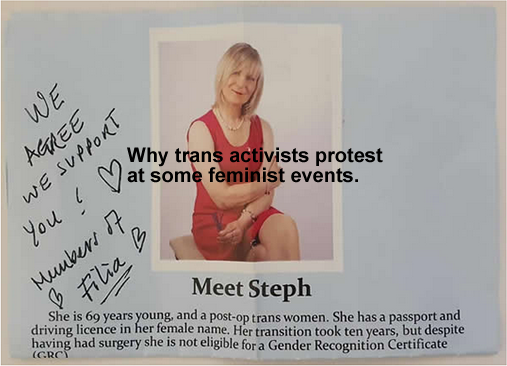
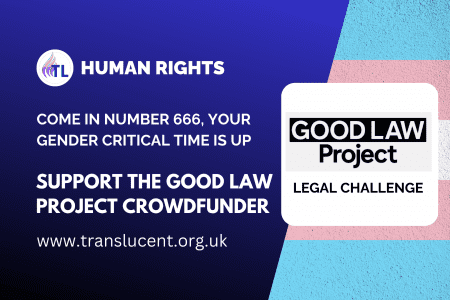
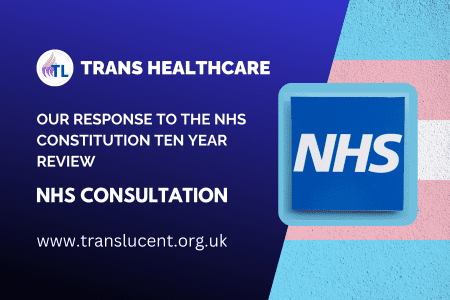
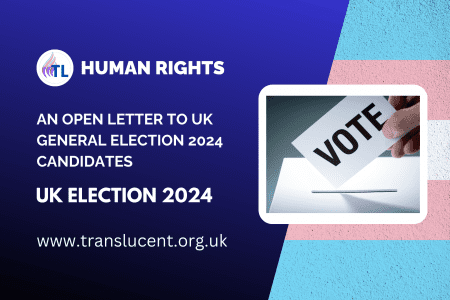
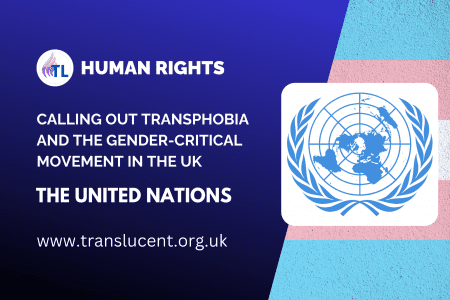
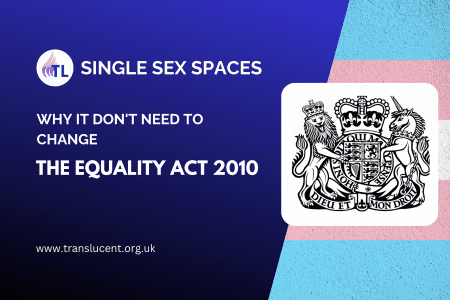

 To provide the best experiences, we use technologies like cookies to store and/or access device information. Consenting to these technologies will allow us to process data such as browsing behaviour or unique IDs on this site. Not consenting or withdrawing consent, may adversely affect certain features and functions.
To provide the best experiences, we use technologies like cookies to store and/or access device information. Consenting to these technologies will allow us to process data such as browsing behaviour or unique IDs on this site. Not consenting or withdrawing consent, may adversely affect certain features and functions.